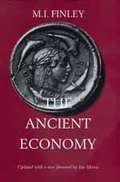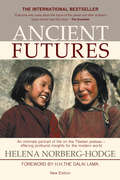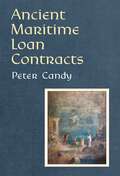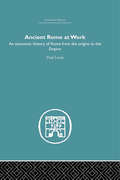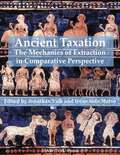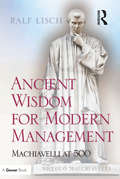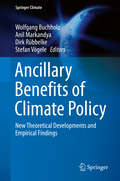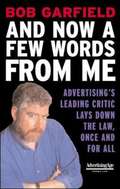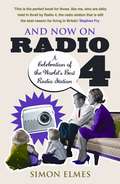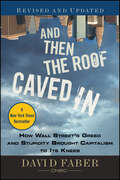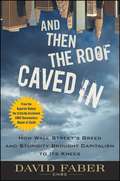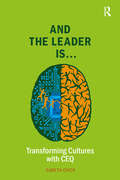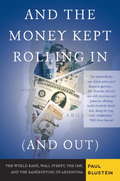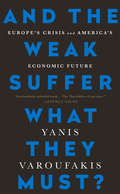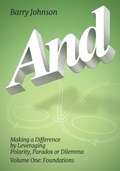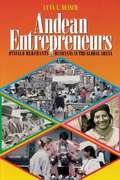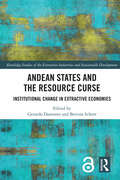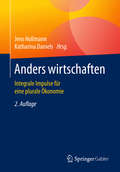- Table View
- List View
Ancient Economy
by Ian Morris M. I. Finley"Technical progress, economic growth, productivity, even efficiency have not been significant goals since the beginning of time," declares M. I. Finley in his classic work. The states of the ancient Mediterranean world had no recognizable real-property market, never fought a commercially inspired war, witnessed no drive to capital formation, and assigned the management of many substantial enterprises to slaves and ex-slaves. In short, to study the economies of the ancient world, one must begin by discarding many premises that seemed self-evident before Finley showed that they were useless or misleading. Available again, with a new foreword by Ian Morris, these sagacious, fertile, and occasionally combative essays are just as electrifying today as when Finley first wrote them.
Ancient Futures, 3rd Edition
by Helena Norberg-Hodge H.H. the Dalai LamaA moving portrait of tradition and change in Ladakh, or “Little Tibet,” Ancient Futures is also a scathing critique of the global economy and a rallying call for economic localization. When Helena Norberg-Hodge first visited Ladakh in 1975, she found a pristine environment, a self-reliant economy and a people who exhibited a remarkable joie de vivre. But then came a tidal wave of economic growth and development. Over the last four decades, this remote Himalayan land has been transformed by outside markets and Western notions of “progress.” As a direct result, a whole range of problems—from polluted air and water to unemployment, religious conflict, eating disorders and youth suicide—have appeared for the first time. Yet this is far from a story of despair. Social and environmental breakdown, Norberg-Hodge argues, are neither inevitable nor evolutionary, but the products of political and economic decisions—and those decisions can be changed. In a new Preface, she presents a kaleidoscope of projects around the world that are pointing the way for both human and ecological well-being. These initiatives are the manifestation of a rapidly growing localization movement, which works to rebuild place-based cultures—strengthening community and our connection with nature. Ancient Futures challenges us to redefine what a healthy economy means, and to find ways to carry centuries-old wisdom into our future. The book and a related film by the same title have, between them, been translated into more than 40 languages.
Ancient Greece
by Robert PayneA history of Greece from its founding to the advent of Philip of Macedon. Covers all aspects of Greek life, philosophy and literature.
Ancient Kanesh
by Mogens Trolle LarsenThe ancient Anatolian city of Kanesh (present-day Kültepe, Turkey) was a continuously inhabited site from the early Bronze Age through Roman times. The city flourished ca. 2000-1750 BCE as an Old Assyrian trade outpost and the earliest attested commercial society in world history. More than 23,000 elaborate clay tablets from private merchant houses provide a detailed description of a system of long-distance trade that reached from central Asia to the Black Sea region and the Aegean. The texts record common activities such as trade between Kanesh and the city state of Assur and between Assyrian merchants and local people. The tablets tell us about the economy as well as culture, language, religion, and private lives of individuals we can identify by name, occupation, and sometimes even personality. This book presents an in-depth account of this vibrant Bronze Age Anatolian society, revealing the daily lives of its inhabitants.
Ancient Maritime Loan Contracts (Law And Society In The Ancient World)
by Peter CandyAncient Maritime Loan Contracts studies the first millennium of the standard form contracts at the heart of ancient long-distance trade, from the fifth century BCE to Justinian. Maritime loan contracts recorded the terms of agreement on which a creditor lent a sum of money to a merchant or carrier to finance the purchase of a cargo for a trading expedition overseas. They were the lifeblood of the long-distance trade in bulk commodities that flourished in the Mediterranean and Black Seas and were also among the first private agreements to be fully committed to writing. From at least the fifth century BCE, these contracts were highly standardized in their terms, containing boilerplate clauses in a tried-and-tested construction. Maritime loan contracts continued to be used to finance maritime trade until the late Middle Ages, when they were only finally superseded by the contract of marine insurance. Combining a wide variety of papyrological, epigraphic, and legal evidence, Peter Candy’s framework illustrates the significance of these contracts in both their economic and legal context. By using an interdisciplinary approach, Ancient Maritime Loan Contracts addresses important questions about how maritime trade was financed in the context of the ancient economy; the response of individual legal cultures to maritime loan contracts; and the relationship between international commercial practice and legal development in the ancient world.
Ancient Rome at Work: An Economic History of Rome From the Origins to the Empire
by Paul LouisFirst Published in 2005. Routledge is an imprint of Taylor & Francis, an informa company.
Ancient Taxation: The Mechanics of Extraction in Comparative Perspective (ISAW Monographs #11)
by Jonathan Valk and Irene Soto MarínA collection of studies that explores the extractive systems of eleven ancient states and societies from across the ancient worldAncient Taxation is a collection of studies that explores the extractive systems of eleven ancient states and societies from across the ancient world, ranging from Bronze Age China to Anglo-Saxon Britain. The contributors discuss the inherent challenges of taxation in predominantly agro-pastoral societies, including basic tax strategy (e.g., taxing goods vs. labor, in-kind vs. money taxes, etc.); the mechanics of assessment and collection; and the politics of negotiating the cooperation of social, economic, and political élites and other important social groups. In assembling a broad range of studies, this book sheds new light on the commonalities and differences between ancient taxation systems, and so on the broader fiscal and institutional practices of antiquity. It also provides new impetus for further comparative research into extractive practices across ancient societies and between antiquity and recent historical periods.The book will be of interest to those studying ancient social and economic history, the history of social organization, and the history of ancient Greece and Rome, Egypt, the Ancient Near East, or ancient China.
Ancient Wisdom for Modern Management: Machiavelli at 500
by Ralf LischMachiavelli lives. 500 years after Niccolò Machiavelli has written 'The Prince', this classic of the mechanisms behind success in management has not lost its relevance. In an intriguing and inspiring interplay of quotes, interpretations and examples, Dr Ralf Lisch develops Machiavelli's most famous work into a practical guide providing Ancient Wisdom for Modern Management. Many have heard about Machiavelli but few have really read and understood him. Ralf Lisch's analysis of ’The Prince’ proves that widespread associations with evil management are a thorough misunderstanding. He has done away with historic ballast and abstains from a moralizing approach that does not do justice to Machiavelli's works. Instead, he lets Machiavelli have his say and provides a positive and pragmatic interpretation of the wisdom of 'The Prince' from a management perspective. It is a fresh approach that combines theoretical analysis with a practical focus. Dealing with a wide range of essential management topics like careers, success, intellect, decision-making, trust, change management, knowledge management, mergers and acquisitions, networking, sustainability, business ethics, working processes and many others, this book proves that the basics of management have hardly changed over half a millennium. Ancient Wisdom for Modern Management is an amazing insight into the essentials of management and a workable guidance to success in daily business. This open-minded and compelling exploration of 'The Prince' combines reading pleasure with a great opportunity to participate in Machiavelli's truly timeless wisdom.
Ancillary Benefits of Climate Policy: New Theoretical Developments and Empirical Findings (Springer Climate)
by Anil Markandya Wolfgang Buchholz Dirk Rübbelke Stefan VögeleThis volume presents new developments in the research on ancillary benefits. Twenty years after the influential OECD report on ancillary benefits, the authors discuss theoretical innovations and offer new empirical findings on various ancillary effects in different world regions. Covering topics such as ancillary health effects associated with reduced air pollution, the influence of ancillary benefits on international cooperation on climate protection, co-effects of carbon capture and storage, ancillary effects of adaptation to climate change, multi-criteria decision analysis covering multiple effects of climate protection actions, and the analysis of primary and ancillary effects within an impure public goods framework, it provides starting points for further research on integrated climate policies seeking to address a range of policy objectives simultaneously.
Ancora: A Primary Healthcare Model for Chilean Public Health?
by Michael Chu Thomas Bossert Monica Silva Mladen KoljaticCase
And Now a Few Words From Me: Advertising's Leading Critic Lays Down the Law, Once and For All
by Bob GarfieldA brazenly funny take on the industry practices that Bob Garfield loves to hate.
And Now on Radio 4: A Celebration of the World's Best Radio Station
by Simon ElmesAnd Now on Radio 4 offers an enthusiast's guide to the shows that have made Radio 4 what it is, and also explores some of the wonderful corners of the network's history that are long forgotten by all but a few. Who, for instance, now recalls Ronnie Barker's starring role on Radio 4 in a sophisticated cabaret-cum-sketch-show called Lines from My Grandfather's Forehead? What about Spike Milligan's intimate, soul-bearing account of his upbringing in colonial India, Plain Tales from the Raj? And who now remembers that Start the Week was once hosted by Russell Harty, a bit of programming compared by one insider to letting Graham Norton run Newsnight.In order to reflect the way devotees listen to Radio 4, the book is organised not on simple chronological lines but in the form of a typical day. Chapter by chapter, the day evolves, from Farming Today, through the daily feast that is Today, through the morning menu of conversation, Woman's Hour, documentary and comedy. Lunchtime brings The World at One. The early evening, of course, yields The Archers. And finally there's Book at Bedtime and Sailing By.An addictive mix of history, biography, anecdote and occasional useless fact, this is the perfect book for Radio 4 aficionados.
And Then the Roof Caved In
by David FaberCNBC's David Faber takes an in-depth look at the causes and consequences of the recent financial collapseAnd Then the Roof Caved In lays bare the truth of the credit crisis, whose defining emotion at every turn has been greed, and whose defining failure is the complicity of the U.S. government in letting that greed rule the day. Written by CNBC's David Faber, this book painstakingly details the truth of what really happened with compelling characters who offer their first-hand accounts of what they did and why they did it.Page by page, Faber explains the events of the previous seven years that planted the seeds for the worst economic crisis since the Great Depression. He begins in 2001, when the Federal Reserve embarked on an unprecedented effort to help the economy recover from the attacks of 9/11 by sending interest rates to all time lows. Faber also gives you an up-close look at where the crisis was incubated and unleashed upon the world-Wall Street-and introduces you to insiders from investment banks and mortgage lenders to ratings agencies, that unwittingly conspired to insure lending standards were abandoned in the head long rush for profits.Based on two years of research, this book provides deep background into the current credit crisisOffers the insights of experienced professionals-from Alan Greenspan to prominent bankers and regulators-who were on the front linesCreated by David Faber, the face of morning business news on CNBC, and host of the network's award winning documentariesFrom regulators who tried to stop this problem before it swung out of control to hedge fund managers who correctly foresaw the coming housing crash and profited from it, And Then the Roof Caved In shows you how the crisis we currently face came to be.
And Then the Roof Caved In: How Wall Street's Greed and Stupidity Brought Capitalism to Its Knees
by David FaberCNBC's David Faber takes an in-depth look at the causes and consequences of the recent financial collapse. And Then the Roof Caved In lays bare the truth of the credit crisis, whose defining emotion at every turn has been greed, and whose defining failure is the complicity of the U.S. government in letting that greed rule the day. Written by CNBC's David Faber, this book painstakingly details the truth of what really happened with compelling characters who offer their first-hand accounts of what they did and why they did it. Page by page, Faber explains the events of the previous seven years that planted the seeds for the worst economic crisis since the Great Depression. He begins in 2001, when the Federal Reserve embarked on an unprecedented effort to help the economy recover from the attacks of 9/11 by sending interest rates to all time lows. Faber also gives you an up-close look at where the crisis was incubated and unleashed upon the world-Wall Street-and introduces you to insiders from investment banks and mortgage lenders to ratings agencies, that unwittingly conspired to insure lending standards were abandoned in the head long rush for profits. Based on two years of research, this book provides deep background into the current credit crisis. Offers the insights of experienced professionals--from Alan Greenspan to prominent bankers and regulators--who were on the front lines. Created by David Faber, the face of morning business news on CNBC, and host of the network's award winning documentaries. From regulators who tried to stop this problem before it swung out of control to hedge fund managers who correctly foresaw the coming housing crash and profited from it, And Then the Roof Caved In shows you how the crisis we currently face came to be.
And the Leader is.....: Transforming Cultures with CEQ (Leadership and Executive Coaching through Corporate Emotional Intelligence)
by Gareth ChickAnd the Leader Is... Gareth Chick's second leadership coaching book, is a critical mentoring guide in business culture, management and organisational behaviour, showing us how to lead effectively with heightened Corporate Emotional Intelligence (CEQ). Drawing on his 40 year experience in every aspect of the Corporate World, from CEO to performance coaching; from manager to trainer, Gareth Chick covers the fundamentals of emotional intelligence coaching to create high performance teams through transformational leadership and authentic change management. In his first book Corporate Emotional Intelligence Gareth provided a compelling analysis of Corporate Psychology; giving us a profound new understanding of how working in the business environment can cause thoroughly decent human beings to behave in unnatural and inhuman ways. The book concluded by outlining the 4 Pillars of Corporate Emotional Intelligence (CEQ), equipping us with personal development strategies to raise our leadership effectiveness. And the Leader Is... completes Gareth's personal corporate life mission to give hard pressed modern managers the practical competencies to be more effective leaders, more fulfilled and more sustainable. While each of his two leadership books stands on its own merits, the combination of the two forms arguably the most important work on corporate leadership since Dr Edwards Demings' writings of the late 20th Century. It is fitting therefore that the Foreword is written by Tony Barnes, the last surviving member of the Deming team that revolutionised Japanese business and manufacturing practices in the 1950s and 1960s. A bible of common sense; a book that cuts to the core of achieving great business results whilst caring for the people you lead.Fionnuala Meehan, VP EMEA Global Marketing Solutions and Head of Ireland, Google.It's like no other book I've ever experienced. It's intensely personal - the insights, the examples, the honesty. This is much more than a book. It's a deep journey.Alison Platt, Non Executive Director, Tesco Plc. I have read many great books on coaching, leadership and teams. However, this is even greater, with all of these areas more expertly placed in one book. Becky Ivers, People Director - Expansion, Heathrow Airport.I was transported into `And the Leader is....Tina'. Easy to read `brain food' providing simple strategies to unlock human potential. This book is becoming my own personal coach.Tina Jennings, HR Director, Global Consumer Brands, Walgreens Boots Alliance.
And the Money Kept Rolling In (and Out) Wall Street, the IMF, and the Bankrupting of Argentina
by Paul BlusteinIn the 1990s, few countries were more lionized than Argentina for its efforts to join the club of wealthy nations. Argentina's policies drew enthusiastic applause from the IMF, the World Bank and Wall Street. But the club has a disturbing propensity to turn its back on arrivistes and cast them out. That was what happened in 2001, when Argentina suffered one of the most spectacular crashes in modern history. With it came appalling social and political chaos, a collapse of the peso, and a wrenching downturn that threw millions into poverty and left nearly one-quarter of the workforce unemployed. Paul Blustein, whose book about the IMF, The Chastening, was called "gripping, often frightening" by The Economist and lauded by the Wall Street Journal as "a superbly reported and skillfully woven story," now gets right inside Argentina's rise and fall in a dramatic account based on hundreds of interviews with top policymakers and financial market players as well as reams of internal documents. He shows how the IMF turned a blind eye to the vulnerabilities of its star pupil, and exposes the conduct of global financial market players in Argentina as redolent of the scandals #151; like those at Enron, WorldCom and Global Crossing #151; that rocked Wall Street in recent years. By going behind the scenes of Argentina's debacle, Blustein shows with unmistakable clarity how sadly elusive the path of hope and progress remains to the great bulk of humanity still mired in poverty and underdevelopment.
And the Money Kept Rolling In (and Out): Wallstreet, the IMF, and the Bankruptcy of Argentina
by Paul BlusteinThis book covers the economic rise and fall of Argentina from the 1980s through 2002. The author discusses the impact of both internal and international economic policies and shows how unfettered international investing weakened Argentina's infrastructure. Filled with personal quotes and interviews, this book tries to show a balanced view of how things happened and why people made the choices that unraveled a nation's economy.
And the Weak Suffer What They Must?: Europe's Crisis and America's Economic Future
by Yanis VaroufakisA titanic battle is being waged for Europe's integrity and soul, with the forces of reason and humanism losing out to growing irrationality, authoritarianism, and malice, promoting inequality and austerity. The whole world has a stake in a victory for rationality, liberty, democracy, and humanism.In January 2015, Yanis Varoufakis, an economics professor teaching in Austin, Texas, was elected to the Greek parliament with more votes than any other member of parliament. He was appointed finance minister and, in the whirlwind five months that followed, everything he had warned about--the perils of the euro's faulty design, the European Union's shortsighted austerity policies, financialized crony capitalism, American complicity and rising authoritarianism--was confirmed as the "troika" (the European Central Bank, International Monetary Fund, and European Commission) stonewalled his efforts to resolve Greece's economic crisis. Here, Varoufakis delivers a fresh look at the history of Europe's crisis and America's central role in it. He presents the ultimate case against austerity, proposing concrete policies for Europe that are necessary to address its crisis and avert contagion to America, China, and the rest of the world. With passionate, informative, and at times humorous prose, he warns that the implosion of an admittedly crisis-ridden and deeply irrational European monetary union should, and can, be avoided at all cost.
And: Making a Difference by Leveraging Polarity, Paradox, or Dilemma
by Barry JohnsonAND is a resource for people who want to make a positive difference. How? By overcoming two obstacles: resistance to change and polarization. From a problem-solving perspective, either of these challenges could be overwhelming. From a Polarity Thinking™ perspective, both can be addressed by replacing Or with And when And is required. Regardless of the size of the system that you want to change, this book guides you through a clear process: <P><P> <li>Seeing: Is this an issue where And is required? <li>Mapping: How can I see a more complete picture and respect alternative views? <li>Assessing: How are we doing with this polarity? <li>Learning: What can we learn from our assessment results? <li>Leveraging: What action steps will we take to make a positive difference? <P><P> Reading this book will help you address resistance to your efforts to make a difference. Also, it will help you address chronic conflicts that become vicious cycles as both sides become more polarized. You will learn when and how to bring And into your efforts to make a positive difference. When done well, supplementing Or-thinking with And-thinking will help you convert the wisdom of those resisting change into a resource to support a more effective change. And-thinking will help you join polarized groups and convert a vicious cycle into a benefit for all. The results will benefit both groups and the larger system of which they are a part.
Andean Entrepreneurs: Otavalo Merchants and Musicians in the Global Arena
by Lynn MeischNative to a high valley in the Andes of Ecuador, the Otavalos are an indigenous people whose handcrafted textiles and traditional music are now sold in countries around the globe. Known as weavers and merchants since pre-Inca times, Otavalos today live and work in over thirty countries on six continents, while hosting more than 145,000 tourists annually at their Saturday market. In this ethnography of the globalization process, Lynn A. Meisch looks at how participation in the global economy has affected Otavalo identity and culture since the 1970s. Drawing on nearly thirty years of fieldwork, she covers many areas of Otavalo life, including the development of weaving and music as business enterprises, the increase in tourism to Otavalo, the diaspora of Otavalo merchants and musicians around the world, changing social relations at home, the growth of indigenous political power, and current debates within the Otavalo community over preserving cultural identity in the face of globalization and transnational migration. Refuting the belief that contact with the wider world inevitably destroys indigenous societies, Meisch demonstrates that Otavalos are preserving many features of their culture while adopting and adapting modern technologies and practices they find useful.
Andean States and the Resource Curse: Institutional Change in Extractive Economies (Routledge Studies of the Extractive Industries and Sustainable Development)
by Gerardo Damonte Bettina SchorrThis volume explores institutional change and performance in the resource-rich Andean countries during the last resource boom and in the early post-boom years. The latest global commodity boom has profoundly marked the face of the resource-rich Andean region, significantly contributing to economic growth and notable reductions of poverty and income inequality. The boom also constituted a period of important institutional change, with these new institutions sharing the potential of preventing or mitigating the maladies extractive economies tend to suffer from, generally denominated as the “resource curse”. This volume explores these institutional changes in the Andean region to identify the factors that have shaped their emergence and to assess their performance. The interdisciplinary and comparative perspective of the chapters in this book provide fine-grained analyses of different new institutions introduced in the Andean countries and discusses their findings in the light of the resource curse approach. They argue that institutional change and performance depend upon a much larger set of factors than those generally identified by the resource curse literature. Different, domestic and external, economic, political and cultural factors such as ideological positions of decision-makers, international pressure or informal practices have shaped institutional dynamics in the region. Altogether, these findings emphasize the importance of nuanced and contextualized analysis to better understand institutional dynamics in the context of extractive economies. This book will be of great interest to students and scholars of the extractive industries, natural resource management, political economics, Latin American studies and sustainable development.
Andela: Africa's AWS for Talent
by Caroline Elkins Tarun Khanna Joyce J. KimFive years after the company's founding, Andela, a company that built and trained remote engineering teams, became arguably Africa's greatest technology unicorn. By January 2019, Andela raised $100 million in Series D funding. As Andela looked to scale in an increasingly competitive landscape, its goal was to democratize trust and become an "Amazon Web Services" (AWS) for software engineering talent. With their windfall investment and the advent of COVID, Andela had to figure out their "2.0 model" to permit scaling. How would Andela stack up in a growing landscape of global remote talent companies? Could Andela become not just Africa's, but the world's AWS for trusted software engineering talent?
Anders wirtschaften: Integrale Impulse für eine plurale Ökonomie
by Jens Hollmann Katharina DanielsIn der 2. aktualisierten Auflage stellen die Herausgeber und Autoren Theorie und Praxis integraler Organisationsentwicklung und integraler F#65533;hrungsmodelle in einen gesamtgesellschaftlichen Kontext. In unbest#65533;ndigen Zeiten, gekoppelt mit Unsicherheit, Komplexit#65533;t und Mehrdeutigkeit braucht es die Gesamtsicht auf die systemischen Dynamiken zwischen Gesellschaft, Organisation und F#65533;hrung, kurz: es braucht Impulse f#65533;r eine plurale #65533;konomie. In einer VUCA-Welt m#65533;ssen F#65533;hrung und Organisationen sich neu erfinden. Dieses Buch zeigt die in der Transformation liegenden Potenziale, auch anhand konkreter Unternehmensbeispiele, auf - und es ermutigt F#65533;hrungskr#65533;fte, mit den dargestellten Methoden zu navigieren.
Andersen Consulting - EMEAI: Reorganization for Revitalization
by Ashish Nanda Michael Y. YoshinoVernon Ellis, managing partner of Andersen Consulting -- Europe, Middle East, Africa, and India (AC -- EMEAI), is considering how best to reorganize. AC -- EMEAI has grown rapidly over the past five years to become Europe's largest consulting operation. However, Ellis feels that the organization needs to be reconfigured if it has to continue on its trajectory of rapid growth. Each of the various alternatives that he is considering offers intriguing potential benefits but also carries considerable risks.
Anderson Street
by William J. Poorvu Leslie M. FederA recent college graduate decides to buy a small multiple-unit building in Boston as a residence and an investment. He learns about finding and valuing properties, property management, construction, and mortgages. After some difficulty he finds a building in an area that is increasing in value. The previous owner has run out of funds to complete renovations.
